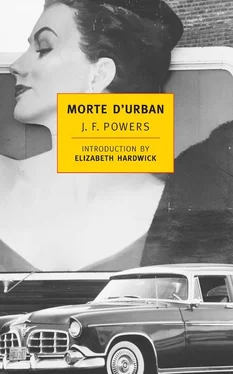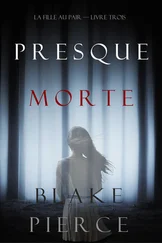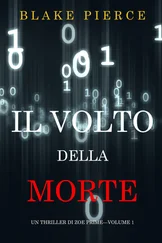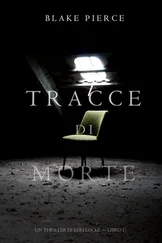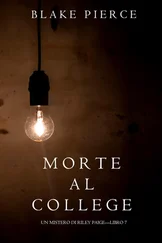“Everybody’s been very nice, but I doubt that it’ll come to that,” said Father Urban.
It didn’t. The next morning, at the chapter meeting, Father Boniface wore a pained expression while Father Urban spoke in behalf of a golf course at the Hill. Father Urban said it was high time somebody considered the plight of the one man for whom the Church was perhaps doing too little. Probably this man had never made a retreat, he said, and would feel funny about making one at, say, a Trappist monastery. This man just didn’t care to get in that deep, as he might express it himself, and still he was up to a bit more than he could get out of a parish mission. This man — so he imagined anyway — wouldn’t care for the company he’d find in a monastery or, for that matter, at a parish mission. You might say, “Well, isn’t that just too bad?” but that wouldn’t change anything for this man. He’d still stay away, and be the loser for it, and so it really was too bad, wasn’t it? Not every man of this type would be a golfer, of course. Golf was just one way (a good one, Father Urban thought) to get at the problem. It was the old, old problem of the unchurched, you might say. That was the problem, then, and the challenge. Would the Order of St Clement, with a little extra effort and no monetary outlay, respond to the challenge? That, of course, was not for Father Urban to say. That was for Father Provincial and the others to decide, said Father Urban, and sat down. He hadn’t mentioned the slim pickings they’d had from retreatants at the Hill. That could come later, if necessary.
Several men, not known to be partial to Father Urban but men he’d walked and talked with the day before, then spoke in favor of the course. The strongest support came from old Father Excelsior who, when he stood up, head to one side, arms thrust down, fists clenched, seemed to be hanging from a rope. Father Excelsior was director of the Millstone Press, and a revered figure in Catholic publishing circles. Father Siegfried, the new procurator, a man closely associated with the administration in Father Urban’s mind, also spoke for the course. Father Urban hadn’t walked and talked with him, and wondered if this might not be a power play on Father Siegfried’s part. The procurator, with his crewcut, and his open, gushing manner, and his bloody claws, was definitely a man to watch.
Finally, Father Boniface rose and suggested that the money would be better spent on pamphlets. At this two or three notorious suckholes (among them Brother Henry) nodded. But Father Boniface said that since this was not the alternative, he would abide by the will of the others and not exercise his veto. Father Urban and his faction, most of them younger men, easily prevailed when the matter was put to a vote. “Permission granted,” said Father Boniface, “and now the other matter.”
Father Urban rose. He expected less trouble in this matter. “This has to do with the Millstone Press, and if you wonder what that has to do with me, or what I have to do with it, the answer is — nothing,” said Father Urban, and drew a smile from just about everybody. “I just happened to be on the scene, you might say, when this thing broke. Father Excelsior has asked me to tell it to you as I told it to him.” Father Urban told the chapter that he’d been brought in close contact with their benefactress, Mrs Thwaites, and through her he’d come to know her son. Richard Thwaites, a Harvard man who’d retained his habits of study (there was nothing to be gained by mentioning Dickie’s sojourns in religious orders), was now engaged in editing a series of what might be called spiritual classics — leading off with translations of Denzinger’s Enchiridion and the so-called “lost books” of Tertullian. Mr Thwaites felt confident that there was an audience for such works in inexpensive, paperback editions, perhaps a large audience, perhaps a very large audience. Father Urban really didn’t know about this, and, frankly, he was doubtful. Father Excelsior, who knew all there was to know about such things, was also doubtful. Mr Thwaites, however, was fully prepared to subsidize the project — the common procedure where scholarly books were concerned. And so, whether or not Mr Thwaites’s faith was justified in a material way was beside the point, fortunately, and need not be discussed. The point was that books of this type weren’t easy to come by. They would be a credit to any publisher’s list. “Isn’t that right, Father?”
Father Excelsior nodded. “These are known as university press books in the trade,” he said, “and, under the circumstances, I think we should be very glad to get them. Strong as our list is, it could be stronger.”
“Now that’s not all,” Father Urban said, and explained that it was young Mr Thwaites’s hope to bring out a series of what might be called children’s classics. Oh, books like Robin Hood and King Arthur and the Knights of the Round Table —but with a Catholic twist. Father Urban had been astonished to hear of the possibilities in this respect. “I’m told that Sir Lancelot is the real hero of the King Arthur story. Well, in the end Sir Lancelot lays aside his sword and becomes a priest. How many people know that? Now, in the case of Robin Hood, Mr Thwaites plans to move the story up in time, to set it in the so-called Reformation period, keeping it in England, of course. It’s all legends, you know, and so you have a pretty free hand. Robin Hood will still steal from the rich and give to the poor — you can’t very well get around that — but he’ll only steal from the rich who’ve stolen from the Church. So it really isn’t stealing. More emphasis, I understand, will be put on Friar Tuck — whether he’ll become the real hero of the book, I don’t know — and also on Maid Marian. It’s pretty generally known that she was Robin Hood’s girl friend, whatever that might mean, but how many people know that Maid Marian ended her days in a nunnery?”
“As a nun?” inquired Father Boniface.
“Yes,” said Father Urban, and this, he could see, was very good news to Father Boniface and to others who might have thought that Maid Marian was just doing time in a nunnery. “Mr Thwaites’s real interest, though, is in the spiritual classics. The children’s classics he calls his ‘bread and butter’ books.”
Father Excelsior nodded. “That’s a term we use in the trade,” he said.
“I don’t have to tell anybody here that such books could be a real shot in the arm to vocations,” said Father Urban.
“Mr Thwaites would like us to act as his publisher,” Father Boniface said. “Why us?”
“He wants a Catholic publisher, of course, and a good one,” Father Urban said. “Mr Thwaites has connections with the Dolomites, and did approach them, I understand, but now he and his mother — she’s a strong influence on him — would rather have us.” There was a bit more to it, which Father Urban didn’t go into. Dickie demanded that both the children’s and spiritual classics bear the name of Richard Lyons Thwaites as general editor. (“Coming from one who’ll not only do the work but foot the bill, a perfectly reasonable request, and I’m certainly amenable to it,” Father Excelsior had said to Father Urban the day before.) The Dolomites, however, didn’t care to be associated in any way with Dickie in Bishop Dullinger’s mind. Their big idea in life was keeping in with Dullinger. What would he think? What would he say? What would he do? Dickie also demanded that the spiritual classics, though bearing the imprint of the Millstone Press, be given a pleasing format, go forth into the world as “Eight Seasons Editions,” and be so announced and advertised. This, too, Father Excelsior said he’d accept, if necessary. The director of the Millstone Press had been having a hard time of it. He was another who’d be happy when Father Boniface’s three years were up. “Thousands for pamphlets, hundreds for the Clementine , and pennies for books.” Father Urban and Father Excelsior had decided it would be better not to raise the Eight Seasons issue at the chapter meeting, since it was a detail over which men with little interest in the larger concerns of publishing might choose up sides.
Читать дальше
